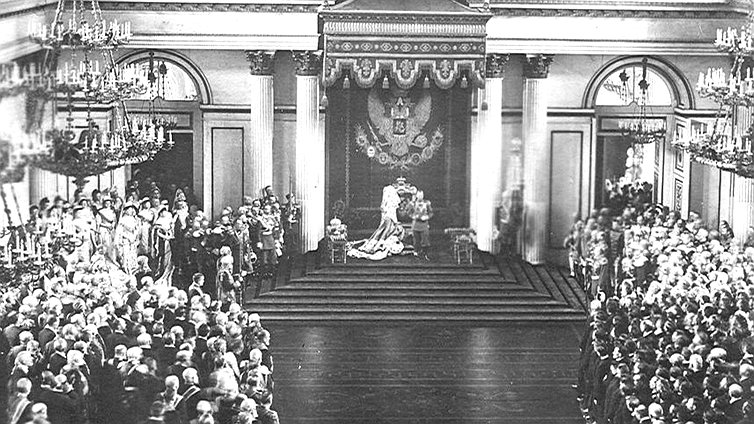
The State Duma in the Russian Empire
The first representative body of legislative power was created in the Russian Empire in 1905 as result of the revolution. On 6 August 1905, Emperor Nicholas II issued a Manifesto on Establishment and Organisational Rules of one of the parliament chambers – the State Duma. The State Council of the Russian Empire became the second chamber. The Duma should have exercised only quasi-legislative function. However, on 17 October 1905, the Emperor signed a new Manifesto establishing that no law could enter into force without an approval of the State Duma.
Thus the State Duma was transformed from an advisory body to a legislative organ. Overall four Dumas gathered till 1917. The Duma consisted of landowners, representatives of the industrial middle class, merchants, city intellectuals, and peasants. A total number of elected delegates of the Duma varied from 478 to 525 in different years.
The First State Duma of the Russian Empire
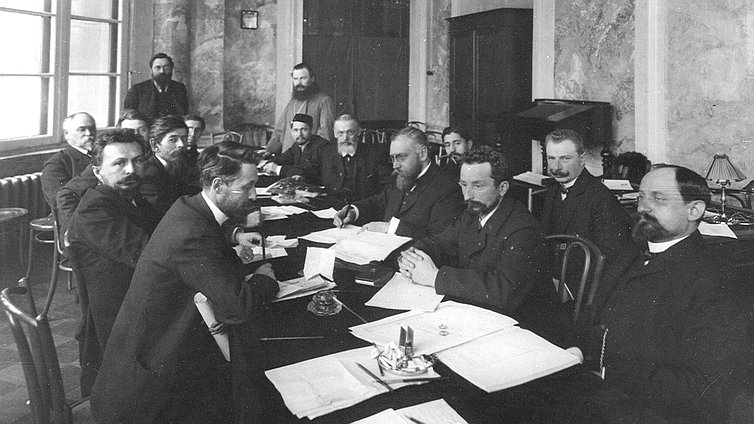
The term of work – 27 April – 8 July 1906
The Chairman: Muromtsev S.A. (Constitutional Democratic Party)
The opening of the first session took place on 27 April 1906 in Tauride Palace in Saint-Petersburg.
The elections to the First Duma were conducted in accordance with a law of December 1905. Six curia were established: landowners, city habitats, peasants, workers, Cossacks, and non-Slavic people. There was no universal (women, young people under 25, military people, some nationalities could not vote), equal (landowners’ curia: one elector from 2 000 persons with a right to vote, city habitants curia – from 4 000, peasants curia – from 30 000, workers curia – from 90 000) and direct voting.
The First State Duma was restricted in its powers and authority. In accordance with the Code of Main State Laws, approved by Nicholas II on 23 April 1906, the Emperor took decisions regarding ministers’ appointment, Russian foreign policy, and declaration of a state of emergency. The Code also provided that the Emperor was entitled to issue new laws on his own behalf.
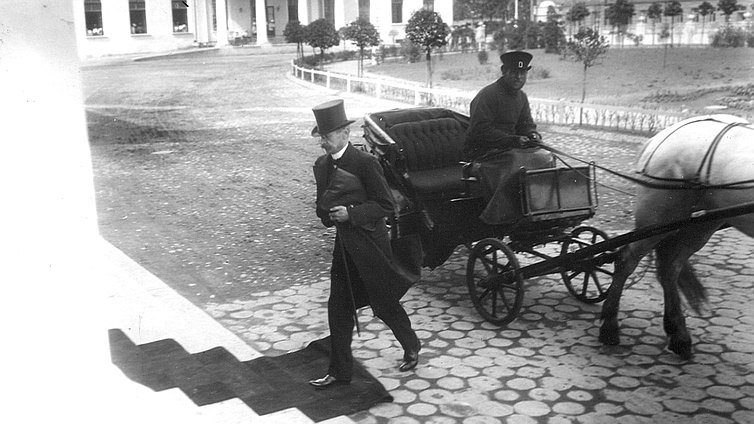
The main issue discussed by the First State Duma was land. The Duma also attempted actively but unsuccessfully to conduct political reforms and called to stop repressions of participants of the Revolution (1905–1907). Overall the delegates approved only one law initiated by the Government. This law assigned 15 million rubles to people affected by crop failure.
The First Duma was dissolved by Nicholas II. It is known as “the Duma of people’s anger”.
The Second State Duma of the Russian Empire
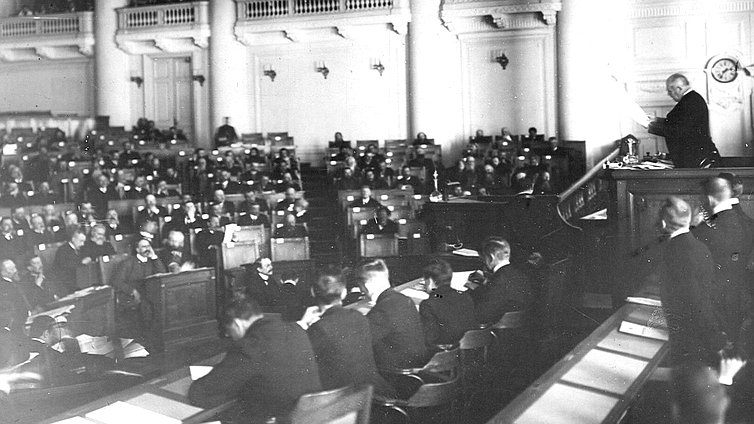
The term of work – 20 February – 3 June 1907
The Chairman: Golovin F.A. (Constitutional Democratic Party)
One of the main tasks of the Second Duma was a resolution of procedural issues as the delegates were intended to expand the authority of the representative body.
The main focus of their attention was an agrarian question and they paid less attention to governmental drafts, counter-revolutionary repressions and measures to improve the financial position of lower classes of the Empire.
The Duma was dissolved in only 102 days after the beginning of its term. 55 delegates were accused in a plot against Emperor’s family. Some members of social democratic faction were said to have connections with “a military organization of the Russian Social Democratic Labor Party” that was planning armed uprising on 3 June 1907 (the so-called the Coup of the June 3rd).
New Regulations on elections were published together with the Manifesto on the dissolution of the Duma.
The Third State Duma of the Russian Empire
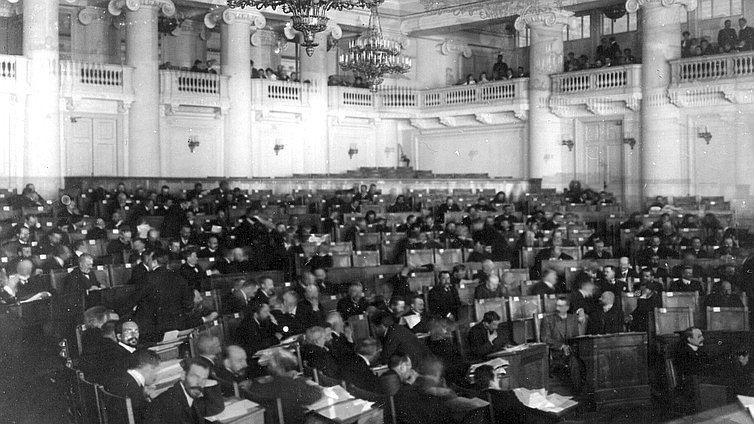
The term of work – 1 November 1907 – 3 July 1912
The Chairman: Khomyakov N.A. (1907–1910, Union of 17 October), Guchkov A.I. (1910–1911, Union of 17 October), Rodzyanko M.V. (1911–1912, Union of 17 October).
The Third Duma was the only one of four State Dumas in the Russian Empire that worked the full statutory five-year term.
Elections were held in accordance with new Regulations on elections of 3 June 1907. The new Regulations restricted election rights of peasants and workers and decreased the number of representatives of so-called national remote areas.
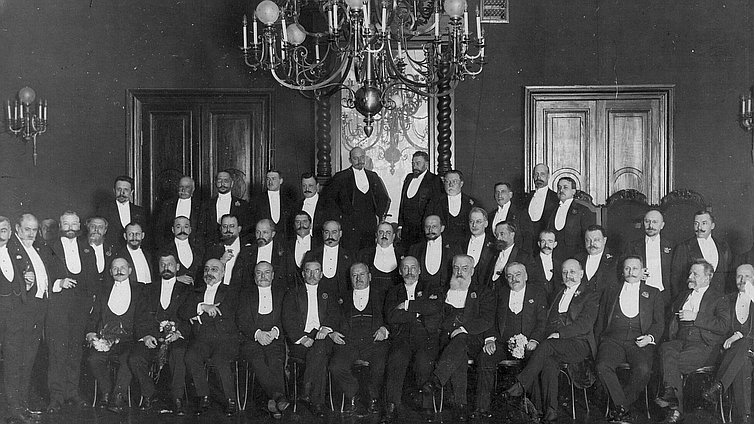
The delegates discussed a wide variety of questions: army reforms, peasants issue, in relation to “national remote areas”, etc. The draft should have been proposed by no less than 30 delegates to become a law. All legislative initiatives were revised by the Duma at three stages of the lawmaking process.
Almost 30 commissions were created to work on drafts. Some of them consisted of several dozens of people, e.g. a budget commission. Elections of commission members were held at a general session of the Duma with prior approval of candidates within factions. The majority of commissions included representatives of each Duma’s faction.
The drafts that were initiated by ministries, first of all, were revised by Duma’s Gathering that included the Duma Chairman, his comrades, the Duma Secretary, and his comrades (all these titles were set forth in documents on creation and organization of Duma’s work). The Duma’s Gathering issued a preliminary report on allocation of a draft to one of Duma’s commissions and after that, the report was approved by the Duma.
Request system was widespread. The delegates having gathered a certain number of signatures could ask a government to provide a report on its actions.
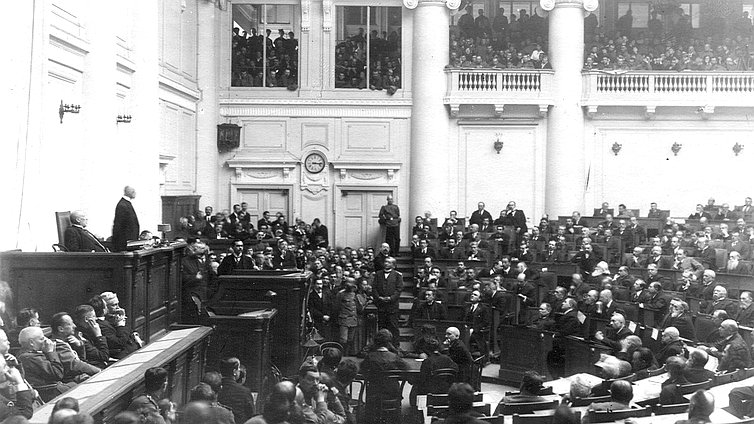
The Fourth State Duma of the Russian Empire
The term of work – 15 November 1912 – 6 October 1917
The Chairman: Rodzyanko M.V. (Union of 17 October).
The work of the Fourth Duma was defined by events inside Russia and on the international arena. After the beginning of the First World War and several large defeats of the Russian army, the serious political conflict appeared between the Duma and executive power. On 25 February 1917, Emperor Nicholas II signed a decree on the dissolution of the Duma till April 1917. However, the Duma continued to gather at private sessions.
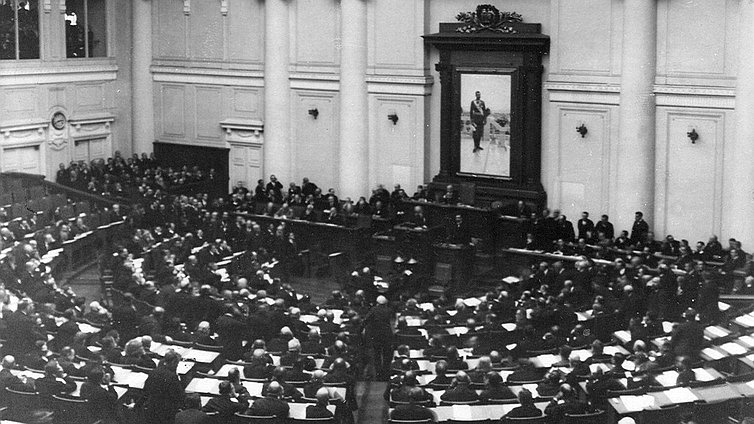
The Duma was one of the centers of opposition to Emperor Nicholas II. On 27 February its members formed the Temporary Committee of the State Duma that by forming the Temporary Government de facto became the supreme authority in the country.
After the monarchy ceased its existence in Russia the Duma never gathered in its full completion. However, the Temporary Committee of the State Duma had regular sessions.
On 6 October 1917, the State Duma was dissolved by the Temporary Government prior to elections to the Constitutional Assembly.
The legislative process in 1917–1991
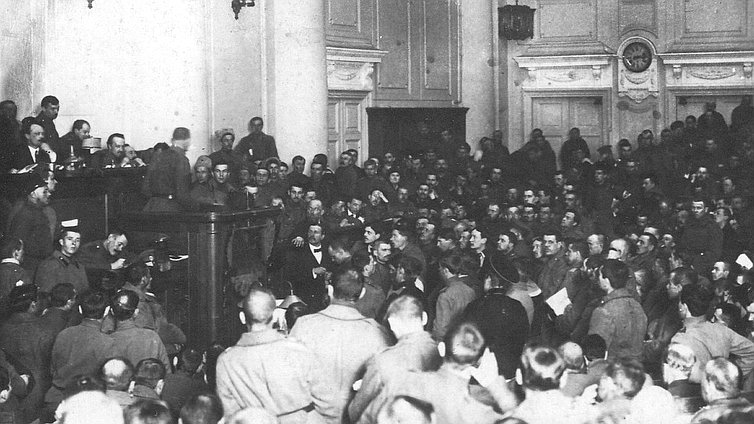
After the February revolution Soviets became a representative body. In accordance with adopted Constitutions of the Russian Soviet Federative Socialist Republic (RSFSR) and Soviet Union of Socialist Republics (USSR), legislative acts were reviewed and adopted by different bodies such as All-Russian Central Executive Committee, All-Russian and All-Union Soviets, Supreme Soviet of the RSFSR and USSR, Soviets of people’s delegates of USSR.
At the beginning an election system was very complex with a lot of stages, not all citizens could vote. However, in 1936, the Constitution established general, equal, direct elections. Moreover, delegates received parliamentary immunity.
On the last stage of the existence of the RSFSR, a position of the President of the Republic was established. He was a superior official and head of executive power. Soviets of people’s delegates and Supreme Soviet of the RSFSR lost a significant part of their competence. Later the President of the RSFSR ceased their existence by a decree.
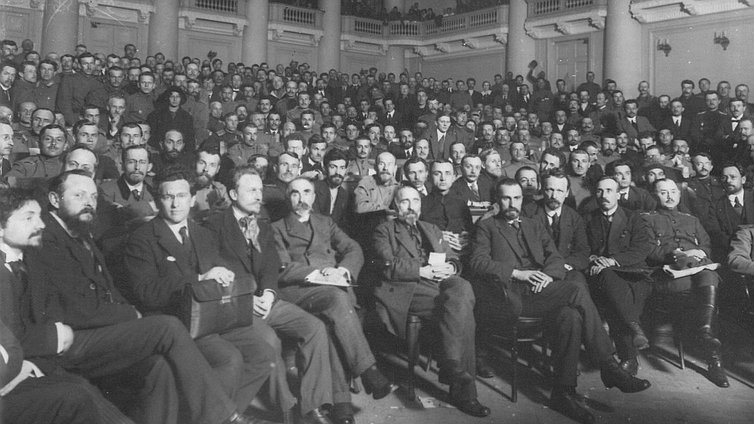
In 1993 elections to the State Duma of the Federal Assembly of the Russian Federation of the first convocation were held.
The State Duma in modern Russia
The State Duma of the Federal Assembly of the Russian Federation of the first convocation
The term of work – 11 January 1994 – 15 January 1996
The Chairman: Rybkin I.P. (Agrarian Party of Russia).
On 12 December 1993 444 delegates were elected: 225 from the federal constituency and 219 from single-mandate constituencies. Elections did not take place in the Chechen Republic and were recognized the void in five constituencies. 8 out of 13 electoral associations (coalitions) managed to get over 5% electoral threshold: “Liberal Democratic Party of Russia” (64 delegates), “Choice of Russia” (64), “Communist Party of the Russian Federation” (42), “Women of Russia” (23), “Agrarian Party of Russia” (57), “Yabloko” (27), “Party of Russian Unity and Accord” (22), “Democratic Party of Russia” (14).
The State Duma of the first convocation adopted 461 laws and 310 of them entered into force. The most socially significant laws were the following: amnesty laws for persons being investigated and remaining in custody in connection with events of 19–21 August 1991 (1991 Soviet coup d'état attempt), 1 May 1993 (fight between opposition forces and the police), and 21 September — 4 October 1993 (a political stand-off between the president and Russian parliament), and the Treaty on Social Accord.
These laws were aimed to decrease social tensions and conflicts after 1993 events.
The State Duma of the Federal Assembly of the Russian Federation of the second convocation
The term of work – 16 January 1996 – 17 January 2000
The Chairman: Seleznev G.N. (Communist Party of the Russian Federation).
Elections took place on 17 December 1995. Four electoral associations got over 5% electoral threshold: “Communist Party of the Russian Federation” (157), “Our Home – Russia” (55), “Liberal Democratic Party of Russia” (51), and “Yabloko” (45). Elections were recognized successful in all constituencies.
Decisions of the Duma were related to increasing of pensions, aids, and expansion of groups of people that were entitled to benefits. Economic laws were aimed to strengthen a role of the state (laws on grain industry, and state regulation of foreign trade activity).
The Criminal Code, the Correctional Code, the Budget Code, the first part of the Tax Code, the second part of the Civil Code, the Forestry Code, the Air Code, the Urban Planning Code, and the Commercial Maritime Code were adopted.
Due to several governmental crises, the delegates of Duma of the second convocation voted 10 times on a Head of the Government: summer 1996, three times in April 1998, three times in September-August 1998, May 1999 and August 1999.
The State Duma of the Federal Assembly of the Russian Federation of the third convocation
The term of work – 18 January 2000 – 28 December 2003
The Chairman: Seleznev G.N. (Communist Party of the Russian Federation).
Elections took place on 19 December 1999. Elections were recognized the void in eight single-mandate constituencies. Reelections to the State Duma in these constituencies were held on 26 March 2000. In single-mandate constituency N31 of the Chechen Republic elections took place on 20 August 2000. Six electoral associations got over 5% electoral threshold: “Communist Party of the Russian Federation” (113), Interregional movement ‘Unity’ (“Medved”) (73), “Fatherland-All Russia” (68), “Union of Right Forces” (29), “Coalition of Zhirinovskiy” (17), and Association “Yabloko” (20).
At eight sessions 781 laws were adopted including laws on the Central Bank and liability insurance of vehicles owners.
Moreover, the State Duma approved a law on insurance of bank deposits that provided for compensation in case of an insured accident.
The delegates approved a law on national symbols: white-blue-red tricolor became a national flag, a poem of Sergey Mikhalkov on old USSR anthem became a national anthem of modern Russia, golden double eagle on dark red shield became a national emblem, and the St Andrews’s flag was used as the Russian Navy Ensign.
The State Duma of the Federal Assembly of the Russian Federation of the fourth convocation
The term of work – 29 December 2003 – 23 December 2007
The Chairman: Gryzlov B.V. (United Russia)
Elections took place on 7 December 2003. Elections were recognized the void in three single-mandate constituencies due to voting against all candidates by a majority of voters. Three political parties and one electoral coalition got over 5% electoral threshold: “United Russia” (223), “Communist Party of the Russian Federation” (52), “Liberal Democratic Party of Russia” (36), electoral coalition “Fatherland” (37).
The main tasks of the State Duma of the fourth convocation were to distinguish powers of federal and regional authorities, modernize army and strengthen fight against terrorism. Moreover, civil society institutions were defined in legislation, e.g. the Public Chamber was established; legislation on non-profit and self-regulatory organizations was updated.
To improve a process of state-building, laws on the abolishment of elections of regions’ heads and on the introduction of a mixed system of regional elections in Russia were adopted. To increase the efficiency of the parliament as a representative body it was decided to switch to proportional representation election system and establish 7% (instead of 5%) electoral threshold.
The Duma also voted for an increase of employee pensions and students’ scholarships.
Special attention was paid to the creation of moderate housing market. That is why the Duma adopted amendments to the Housing and Urban Planning Codes. The beer advertisement was restricted to protect nation’s health and decrease consumption of alcohol.
The State Duma of the Federal Assembly of the Russian Federation of the fifth convocation
The term of work – 24 December 2007 – 20 December 2011
The Chairman: Gryzlov B.V. (United Russia)
At elections, “United Russia” received a constitutional majority (315). The Communist Party received 57 mandates, “Liberal Democratic Party of Russia” – 40, “A Just Russia” – 38. 50% of the Duma’s delegates were renewed.
World economic crisis of 2008–2010 determined priorities of the State Duma of the fifth convocation. To support state’s financial system the Duma promptly adopted several laws.
The Duma adopted laws on the extension of the presidential term to 6 years and term of Duma’s delegates to 5 years. The election system was also changed, including the abolishment of electoral deposit for political parties.
Special attention was paid to the social sphere. Police law and law on social guarantees for law-enforcement officials provided for an increase of their salaries. Moreover, 170 thousand veterans of the Great Patriotic War (1941–1945) received free apartments. The minimal salary was also increased.
The Duma’s delegates adopted several anti-corruption laws and changed fines for traffic violations.
The State Duma of the Federal Assembly of the Russian Federation of the sixth convocation
The term of work – 21 December 2011 – 4 October 2016
The Chairman: Naryshkin S.E. (United Russia)
Elections of the delegates of the State Duma of the sixth convocation were held on 4 December 2011. For the first time, the delegates were elected for 5 years. Four parties won elections: “United Russia”, Communist Party, “A Just Russia” and Liberal Democratic Party.
The main task of this Duma was to adopt laws on the integration of the Republic of Crimea and the federal city of Sevastopol to the Russian legal framework.
In the economic sphere, the Duma supported anti-crisis measures proposed by the Government. Thus the Duma assigned 1 trillion Russian rubles to support banks, doubled the insurance protection of deposits to 1,4 million rubles and increased immediate payment of the maternity capital to 25 thousand rubles.
The delegates approved a political reform, including the introduction of direct elections of the regional governors, simplification of parties’ registration, a reintroduction of single-mandate constituencies, and rescheduling parliamentary elections for September.
Due to the aggravation of tensions with Western countries, the special attention was paid to the strengthening of interparliamentary relations within the Eurasian Economic Union and BRICS.
The Duma of the sixth convocation introduced a tradition of annual International Parliamentary Forum.
The State Duma of the Federal Assembly of the Russian Federation of the seventh convocation
The term of work – 5 October 2016 – 12 October 2021
The Chairman: Volodin V.V. (United Russia)
Elections to the State Duma of the Federal Assembly of the Russian Federation of the seventh convocation were held on 18 September 2016. Members of the State Duma were elected by a mixed electoral system: 225 deputies in the federal constituency and 225 deputies in single-mandate constituencies. Members of four political parties became the State Duma deputies: United Russia (343), the Communist Party of the Russian Federation (42), LDPR — the Liberal Democratic Party of Russia (39), and A Just Russia (23).
Representatives of political parties, elected deputies of the State Duma, formed four factions. There were also two independent members at the State Duma of the seventh convocation.
Vyacheslav Volodin was elected Chairman of the State Duma of the seventh convocation at the plenary meeting on 5 October 2016.
One of the most important issues in the work of the deputies of the seventh convocation was the introduction of amendments to the Russian Constitution. Those amendments were adopted in the final reading on 11 March 2020, and after that they were put to a national vote and later supported by the Russian citizens. The State Duma adopted 27 laws to develop new norms of the Russian Constitution.
The number of socially significant laws had increased and that helped to solve everyday problems of people, including education, health care, housing and utilities issues and interaction of citizens with state structures. On average, the number of such laws was 21.5%, and in the final session it reached 33%.
The deputies also tried to solve issues of the families, motherhood and childhood. One of the important issues was the solution of the problems of investors defrauded by dishonest construction companies. The adopted laws made it possible to exclude financial risks for Russian citizens when they buy an apartment in a block of flats under construction. Parliamentarians paid special attention to issues of improving legislation related to health protection, especially in the conditions of the spread of COVID-19.
An important task of the seventh convocation of the State Duma was improvement of quality of the legislative initiatives, there were held parliamentary hearings were on the problems of investors defrauded by dishonest construction companies, renovation in Moscow, etc.
In addition, members of the State Duma had managed to reduce the backlog of the bills that had been introduced to the State Duma since 1994. By the end of the term of the seventh convocation, there were only 26 of such bills, which is 1.3% of all the pending bills.
The State Duma of the Federal Assembly of the Russian Federation of the eighth convocation
Term of work: 12 October 2021 — now
Chairman: Volodin V.V. (United Russia)
Elections to the State Duma of the eighth convocation were held on 17–19 September 2021. Members of the State Duma were elected by a mixed electoral system: 225 deputies in federal constituencies and 225 in single-mandate constituencies. Five political parties were elected to the State Duma: United Russia (324), CPRF (57), A Just Russia — For Truth (27), LDPR (21), New People (13). There are also 5 independent members of the State Duma.
Representatives of political parties elected to the State Duma formed five factions.
Vyacheslav Volodin was elected Chairman of the State Duma of the eighth convocation at the plenary meeting on 12 October 2021. Representatives of four factions, 360 members of the State Duma supported his candidacy. Earlier, the Russian President Vladimir Putin endorsed the nomination of Vyacheslav Volodin as the Chairman of the State Duma.
“Our priority issues should be aimed at Russia’s development, achievement of national goals, implementation of tasks set by the President in his Address to the Federal Assembly,” emphasized Vyacheslav Volodin.
“We should organize our work such way that representatives of all five factions would take part in discussions and adoption of bills. Our President had stressed that several times,” added the Chairman of the State Duma.
He noted another important task — increase in the number of directly applicable laws, as that would help to improve quality of legislation.
Vyacheslav Volodin also stressed importance of promotion of dialogue with civil society, regions, experts, trade unions and business community. According to him, it is also necessary to develop proposals to increase responsibility of members of the State Duma and to present reports on their work.

